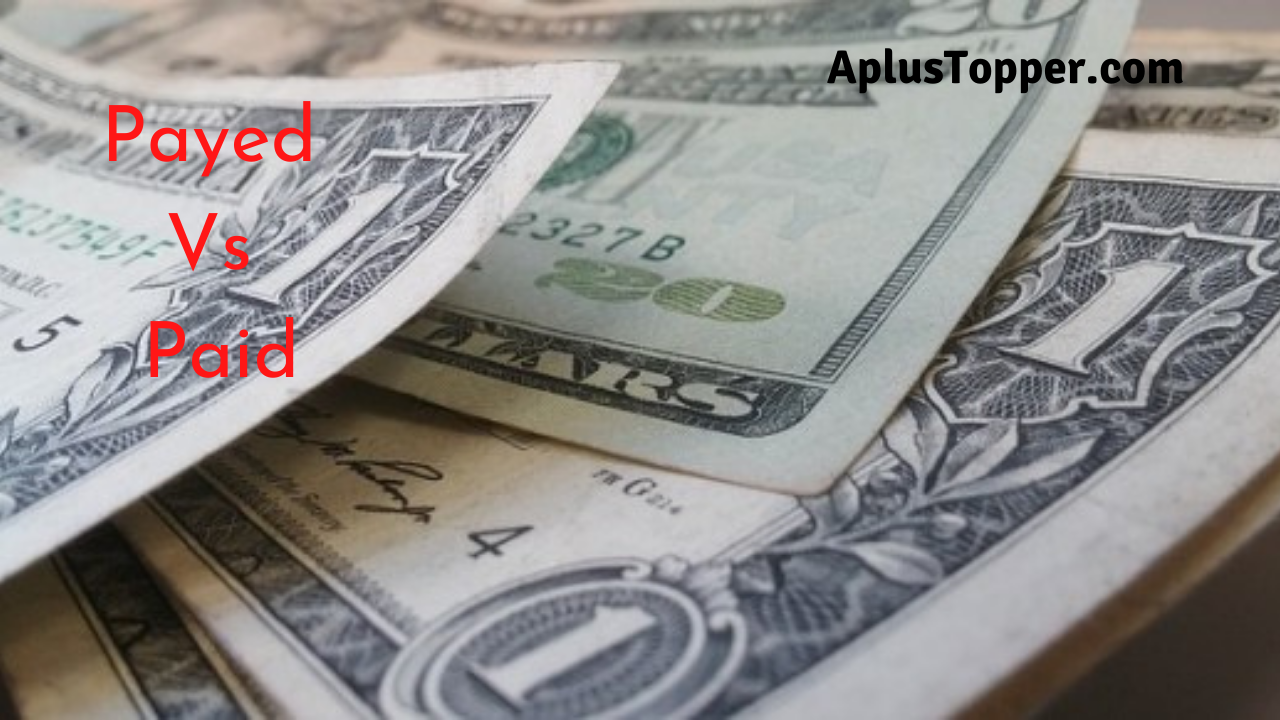Payed or Paid: Paid is the norm past tense and participle of pay. Payed was generally utilized for the nautical feelings of pay and in the phrasal action word payout where what’s payed out is rope. The structure actually shows up sometimes, yet paid now wins even in payed’s customary employments.
The right past tense of the action word pay is paid, as long as the word is utilized in the monetary or value-based sense. In the event that the action word pay is utilized from a nautical perspective, the right structure is payed.
How to Use Paid?
As referenced, the word pay is an unpredictable action word. The three chief parts are pay (present), paid (past), have paid (past participle).
Paid is additionally the previous tense and past participle of pay and is utilized in a literal sense other than the nautical importance. Paid by and large has something to do with giving or moving cash yet has different implications, for example, to visit or to call.
Furthermore, the word paid capacities a descriptor, showing as being set apart by the receipt of installment, or having been paid for.
For instance:
- One of the worker’s advantages is getting paid wiped out time. (Descriptive word)
- Joey is a paid endorser for Colonial Penn disaster protection. (Descriptive word)
- Paid is either a previous tense transitive action word, or it acts as a modifier.
How to Use Payed?
Payed is the previous tense and past participle of the action word pay yet is utilized in an exceptionally restricted sense. Payed has a typical and authentic use as a nautical term having to do with ropes and boat structures.
- To pay out a rope or link is to let out by loosen.
- The skipper payed out extra rope for the sails.
- The development works payed out the link as he hung the line.
- Setting down phone lines, he payed out the link as he went.
Payed can likewise allude to the fixing of a deck or frame of a wooden boat with pitch or tar to forestall spillage.
- Have you payed the deck?
- This boat looks fine yet still can’t seem to be payed.
These are the solitary uses where you ought to wind up utilizing payed, when managing link, rope, or chain being let out by loosen or the fixing of a wooden boat.
When utilized as the previous tense of pay, payed is a spelling blunder.
For instance,
- I won’t pay for this lodging a second time when I as of now payed on the web.
- I payed my lease on time each month last year.
Payed can be the right spelling, yet just in two extremely restricted definitions. The main definition is to offer leeway to a rope, in the straightforward past tense structure payed out. The subsequent definition has a nautical beginning. It is to cover with tar in the straightforward past and past participle structures.
As you would envision, these two implications are uncommon to such an extent that you will probably never, or never, see or use them.

Meaning of Pay
Pay is an expression of Latin beginning, which discovered its direction into the English language through the Anglo-Norman paier. The Latin root is the action word pacare, which signifies “to conciliate.” Today, we use pay to say several distinct things, however, the majority of them have something to do with an exchange—when you pay somebody for products, you’re giving them cash for the merchandise. Or then again when you’re focusing on something, you are giving your consideration.
The implications of the action word pay that stand apart are the nautical ones. In those cases, pay can mean one of a few things: it can intend to waterproof joints by painting them with tar and sap; it can intend to allow the boat to tumble off leeward (pay off), or away from the wind (pay away); it can intend to let out a rope or chain by loosening (payout).
FAQ’s on Payed or Paid
Question 1.
Is it payed attention or paid attention?
Answer:
The correct impression is paid attention not payed attention.
Question 2.
Why is paid not spelled as payed?
Answer:
Utilizing payed will, best case scenario, befuddle your perusers and even from a pessimistic standpoint could make them think your composing is uninformed or amateurish. Payed is the wrong form of paid which you shouldn’t utilize. Paid is the straightforward past tense and past participle type of pay, which means to give cash in return for something.
Question 3.
Is payed a scrabble word?
Answer:
Yes, payed is a scrabble word in the dictionary.
Question 4.
What does pay a visit mean?
Answer:
Pay a visit means to go somewhere to spend own’s time.
